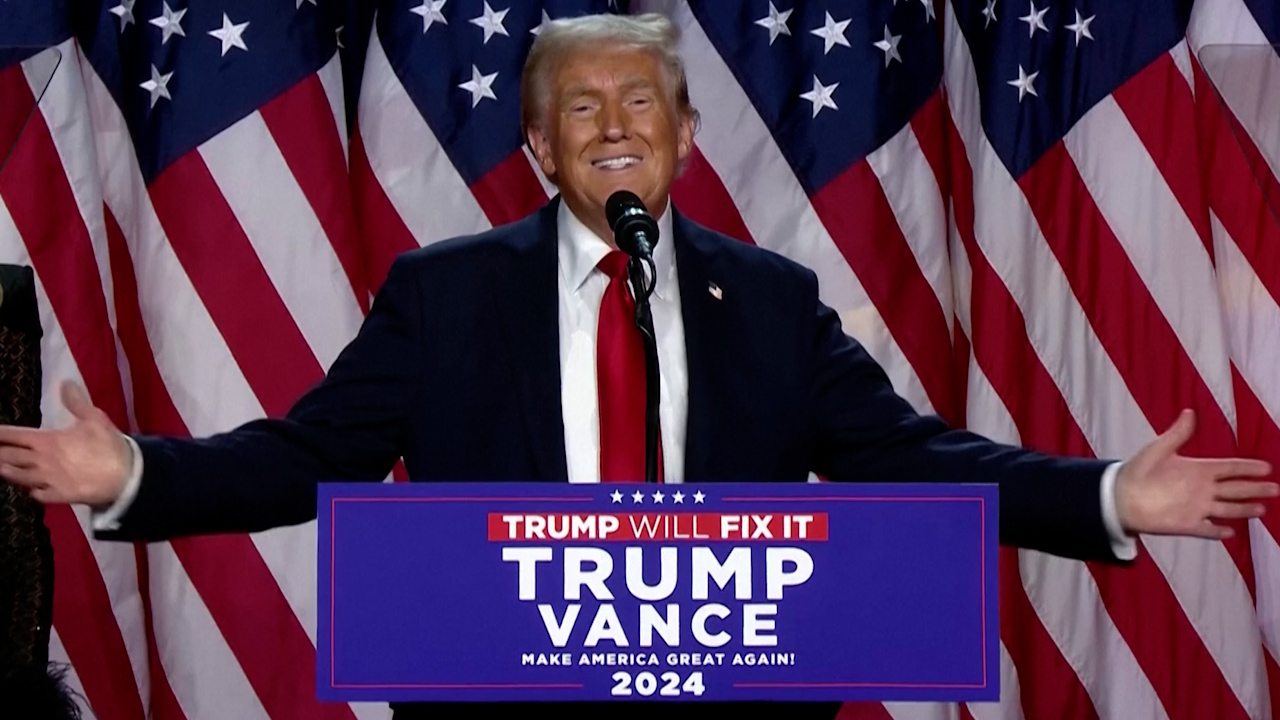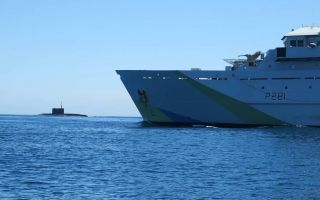
Sitrep: Ukraine and Nato support, deterring China and peace in the Middle East

On 5 November, the question of who was going to be the 47th President of the United States was answered, but what this means for the rest of the world is yet to be seen.
Following the result, Sir Keir Starmer said "the UK and US will continue to work together to protect our shared values of freedom and democracy".
But not everyone is convinced the two nations' values are that closely shared.
In his campaign, Trump did little to alleviate some fears allies of the US have over a second presidency, including comments from the next president that he would not defend Nato countries who did not contribute 2% of GDP to the alliance.
A number of experts discussed how the upcoming Trump presidency could change the world on this week's Sitrep – which analyses the top defence stories of the week and is available wherever you get your podcasts.
What is the aim in Ukraine?
The biggest area of concern about a second Trump presidency is, for many, Ukraine.
Sitrep's resident expert Michael Clarke said the Trump administration has said the conflict "must come to an end fairly quickly".
Trump has not always been vocal in his support for Ukraine, but a number of experts told BFBS Forces News that the next US president will not want to be perceived to 'lose' the conflict.
Lieutenant General (Retired) Ben Hodges was Commanding General of the US Army Europe from 2014 to 2018.
He said Trump "will not want to have this loss… hung around him if he rolls over for the Kremlin".
But, he said the Ukrainians themselves are still concerned.
"I think that Ukrainians are concerned, but they also have no intention of just rolling over just because the American president makes a deal of some sort with the Russian president," he said.
"The other countries in the region, particularly Poland, Estonia, Latvia, Lithuania, Finland, I don't think they'll just acquiesce to whatever is done between the American president and the Russian president as if this was the 18th century."
The former military leader added that he hopes European allies will "implore President Trump to defend what matters to all of us, which is sovereignty of borders".
"But don't accept a status quo where Russia is rewarded with 20% of Ukraine, including Crimea, the most important part of Ukraine," he said.
So does this mean he will continue to support Kyiv?
There has been criticism of the Biden administration for dragging its feet on the armament of Ukraine.
There is also a school of thought that says this election result could be good for Ukraine as Trump can be persuaded to better arm Kyiv, which would, at the very least, improve its negotiating position.
For a man who prides himself on 'The Art of the Deal', a strong negotiating position could appeal to the president.
Sir Mark Lyall Grant is a former UK ambassador to the United Nations and was the UK's national security adviser when Donald Trump first won the presidency eight years ago.
He said it is "not obvious that President Putin would accept an immediate sort of cease-fire and the status quo".
"[Putin] hasn't achieved his initial war [aims] in any form at all and he probably has greater ambitions of territorial gain in Ukraine," he said.
"And he will certainly want a guarantee of Ukrainian neutrality in exchange for ceasing the conflict.
"So it's not obvious that Putin will welcome a Trump imposed, as it were, a settlement on day one."
Lt Gen Hodges also said it will be interesting to see how long it takes Russia to threaten nuclear action now Trump is in the White House.
"When do they start putting out their red-line warnings again?" he said.
"This will be an early test, I think."
China, Nato and bilateralism vs transactionalism
Prof Clarke pointed out that a strength of the West is "its collective nature, its alliances, its arrangements" – something "both China and Russia want to break down".
"They always want to deal bilaterally because… [it's] greater than when they have to deal with a collective group of Western nations, whether it's economically or in defence terms," he said.
This, Prof Clarke explained, is something China, Russia and Mr Trump have in common.
"Trump himself is a naked transactionalist, as it is said, as a business person," he said.
"And he himself prefers bilateral relations. He doesn't like collective groups, He doesn't perform terribly well in front of them.
"When he goes to summits, he tries to wreck them, mainly, I think, because he doesn't feel that he can control them – so if he can't control them, he wrecks them.
"So his own instinct is to be bilateralist."
Sir Mark also added that "Trump's unpredictability and his fiery rhetoric… can work with enemies, but it scares the hell out of America's allies".
But, while this has its downsides, it could, in fact, benefit Nato.
"It has had some impact because when President Trump came into office last time, only five Nato countries were spending 2% of their GDP on defence," he said.
"Now it's 21 countries. So there has been an increase."
Although this could be attributed to Nato countries stepping up defence spending as a result of the war in Ukraine, it is still important the US, and Nato, is seen to be standing up to adversaries, such as Russia, as it sends a message.
Sir Mark said China is watching the conflict in Ukraine "extremely carefully" and the West's response to Russia's invasion of Ukraine is "deterring China from doing something militarily against Taiwan".
"Because they realise that actually in military terms, that task is even more difficult than what Putin faced in Ukraine," he said.
"But the corollary is also true that if the West is seen to give in and concede to Putin on Ukraine, that sends a very damaging message about what the West would be prepared to do if President Xi decided to move on Taiwan."
It is not just direct military action that China is concerned about, with President Trump also threatening to impose tariffs on imported goods.
This could lead to "a major global trade war", Sir Mark warned, with China not "popping the Champagne corks quite as President Putin, no doubt is. in the Kremlin" as a result of Trump's return to White House.
Will Israel be able to do what it wants?
The Middle East is on a knife edge, with Kamala Harris' stance on Israel's continued campaign in Palestine arguably one of the factors that cost her votes in the election.
One success claimed by Trump in his first term was the Abraham Accords – a series of agreements to normalise relations between Israel and several Arab states.
Sir Mark said "life has moved on a lot in the Middle East" since Trump's first administration, but the Abraham Accords have not been revoked – although they have been "put on ice, essentially".
Sir Mark did say he thinks American policy will continue to support Israel as "if anything, Donald Trump will be willing to give Netanyahu a pretty free rein on how he tackles his enemies".
"The one red line I'm sure he will draw is not sucking America into an offensive military operation against Iran," he said.
Lt Gen Hodges said he agreed Israel's Prime Minister "will feel he has a free hand now, whether that's true or not".
"At this point, they will feel they can do whatever they need or want to do in Gaza without fear that a Trump administration will be pressing them the way that a Biden, or if there had been a Harris administration, on the use of excessive use of force amongst the Palestinians," he said.
"But that's problematic because the Saudis are going to be reluctant to become fully engaged in the Abraham Accords as long as the Palestinians are getting pounded by the Israelis."
"That creates a problem for the Trump administration to develop further the potential of the Abraham Accords.
"If you've got Israeli Defence Force continuing to kill lots of Palestinians that will be problematic."
He also said the Trump administration should take on an Iran-first policy.
"If we could encourage the administration to look at helping Israel by isolating Iran, which would be one of the side effects of defeating Russia, then I think there's a potential there that helps Israel and brings about a better result in the Middle East with a defeated or much weaker Iran," he explained.
Sir Martin did say the Middle East is an area the outgoing Biden administration has "some room for manoeuvre over the next two-and-a-half months".
"It won't be that surprising if there is a move by certain countries at the UN to put forward a resolution in the Security Council on parameters for a two-state solution, which the Biden administration would not veto," he said.
"That would set a sort of line in the sand, which protects the possibility of a future Palestinian state, something that Netanyahu would find very unhelpful."
Trump's guardrails
Mr Trump will need a cabinet officials and military chiefs to advise, discuss and then do as asked – often called the guardrails of the US system of government.
Last time around, President Trump had many former top military officers into some of those posts.
Almost all fell out with him very publicly.
He said hiring some of them was his only regret about last time round.
Well, some of those ex-Trump staffers helped form a group known as NSL4A, or National Security Leaders for America.
In this election they backed Kamala Harris, with more than 250 retired admirals and generals signing that letter of endorsement, including Brigadier General Peter Zwack.
"We hope that this is a thinking group and not a rubber stamp, because Putin and others out there are watching very, very closely," he said.
"By the end of his first term, all his generals short one or two of them were gone. And that leaves a lot of distaste for the military, both active and retired.
"When you say that your former chairman of the joint chiefs was a traitor and should be executed or soldiers that had been captured or killed in war were losers, it doesn't compute.
"It doesn't work and so increasingly, you had men and women who by definition are loyal but not blindly loyal – and this is what [Trump] was looking for."
Lt Gen Hodges agreed.
"I will be very anxious if there is a litmus test of some sort unspoken that checks the loyalty of incoming military leaders to make sure that if he says something that the chief of the Army or the Navy or the chairman will do exactly what he said, versus saying, 'Well, Mr President… We can't do that, you can't use the military to do this thing'," he said.
"My sense is that he and his team will want to remove or not have anybody in uniform that would offer that."
This sentiment was also echoed by Sir Mark, who said he overlapped the first four or five months of the Trump presidency.
"After inauguration, I had three opposite numbers as national security adviser," he said.
"This time the only people who will agree to go into the White House are those who are true believers or people who are 'yes' men and are not prepared necessarily to speak truth to power, at least in the early months.
"I don't think that is a good decision-making environment."
You can listen to Sitrep wherever you get your podcasts, including on the Forces News YouTube channel.









